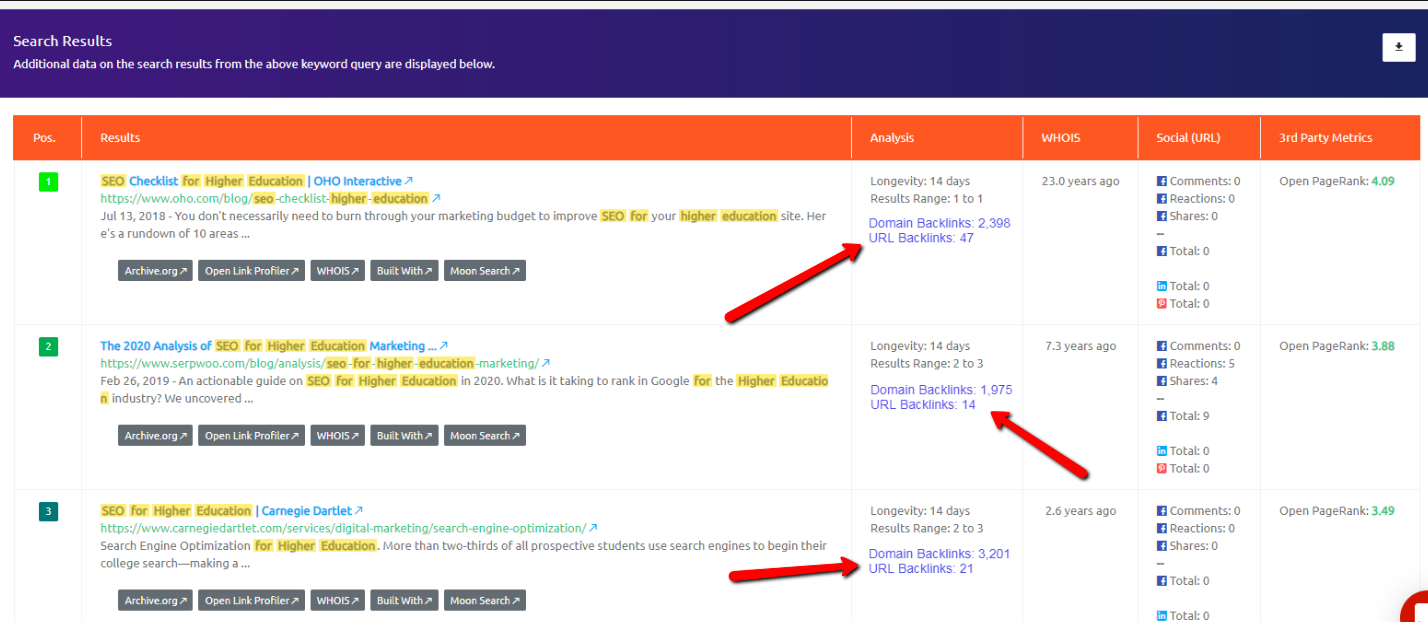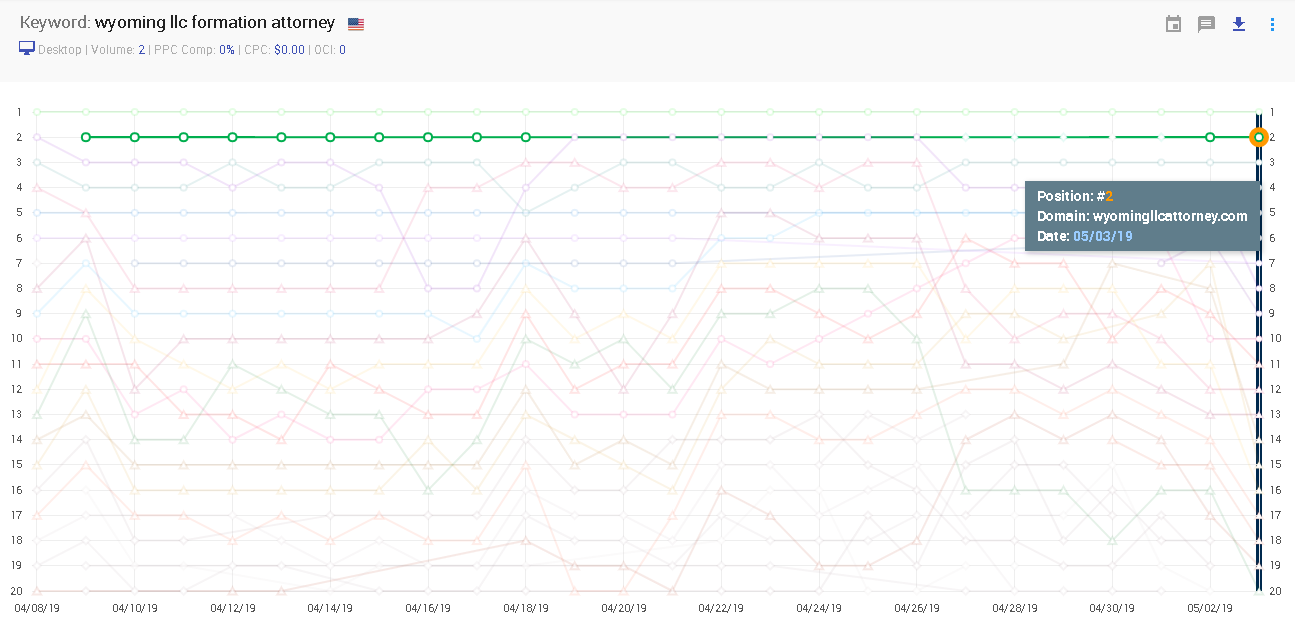The 2020 Analysis of SEO for Lawyers and Attorneys

Analysis: SEO For Lawyers and Attorneys In 2020
Hey WooNation,
Time for "What It Takes To Rank Attorneys and Lawyers In 2020". Or basically, how to do lawyer SEO in today's SERP landscape. This is our 6th release of "What it takes to rank in X industry right now" by digging into the legal seo industry for an update to 2020.
If you haven't read our analysis from last year, I advise you to take some time to digest that article before reading this one:
Word of caution, this analysis is slightly different than the one in 2019.
Last year I did a lot of my images as a full page 1 through page 10 layout, like this:

This year I opted for a cleaner and more informative layout, like below:

Just wanted to get that out of the way as I know many that read last years analysis might be confused with this years layout.
We also decided to NOT do a backlink analysis this year so we could internally spend some time working on our SERPWoo Backlink Profile database, which will be able to show you backlink counts and data on domains and URLs you want to research within SERPWoo.
Wanna see what it might look like?

We are also planning functionality that will allow you to export the backlinks as well. Trust me, that's time better spent providing you more value in SERPWoo than digging into backlinks for this analysis at the moment.
While this year's analysis is a tad different, we feel you will still grab a lot of value from it. So lets dig in!
What's Helping Attorney SEO Rankings This Year?
Well, it's not Word Count.
That didn't even register as a variable this year in the Legal niche, which was a surprise.
I did find some strange lumping of variables in my analysis that I haven't seen much of before though.
Strange enough to make me do a double take.
But let's start with the analysis itself first...
So how did I perform this analysis? I used several 3rd party tools ( including SERPWoo ) to study hundreds of legal keywords and thousands of URLs over the course of a month.
Legal keywords like:
- Albuquerque immigration attorney consultation
- best criminal defense attorney near me
- divorce lawyers in Chicago free consultation
- IRS tax lawyer Houston Tx
- Louisville DUI lawyer
- Miami personal injury lawyer
- New York family court law lawyers
- real estate law firm attorney Bend Oregon
- San Diego maritime attorney
- top Scottsdale intellectual property attorney
- Wyoming LLC formation attorney
I pulled the top 100 ranking URLs for each keyword and used Spearman correlation on thousands of variables to find out what is showing statistical relevance in helping rank the front page websites against those that are ranking on page 2-10 in Google.
Variables I looked that ranged from count of tags, count of elements in tags, the size of different tags ( in kilobytes ), where keywords were located in the HTML document, outbound links from the HTML document, and many more variables.
And here is what I didn't look at...
Last year, I included backlinks as a factor. This year I decided not to include backlinks for a couple of reasons which I touched on above.
- We all know more backlinks can mean better rankings. But it really comes down to the right type of links
- Check last year's article for more proof of what I mean
- SERPWoo's backlink count tool is almost ready to release. I didn't want to hold this article up though.
- I've seen plenty of new websites with almost no backlinks ranking top 3 for competitive terms.
- I've done a project like this myself, it's available at "Ranking A New Website From Scratch"
So I decided to keep backlink analysis out of this study for now in hopes to show you what's working outside of backlinks for the time being.
With that out of the way, lets look at the elephant in the room.
Lawyer SEO: Keyword Stuffing Like It's 1999

Keyword stuffing?
I'm only half-way serious here, but it really is about the keywords and not so much other variables like Word Count.
In other niches ( Higher Ed, e-Commerce, etc ), we found variables like FORMs, Images, Word Count, and other items can heavily impact rankings.
In the legal industry, it's more about keywords and how they are used.
Here are the top 10 variables I found across the first 10 pages of Google for Legal SEO:

And the top 10 variables I found when digging into just the top 10 on the front page of Google:

And when you really look at a lot of the variables, many can be combined.
Your A tags will more than likely be in DIV tags, and your DIV tags will be in the BODY tag.. which will be in your HTML tag. Many instances of this kind of combination can happen.
I ended up with this listing by first coming up with variables that had a good Spearman correlation for front page rankings. I then looked at how many times ( frequency ) that variable came up per keyword and ranked the frequency to see across the niche what was coming up multiple times.
Finally, I added in the difference as a percentage between the 1st page compared to the other 9 pages ( top 100 listing ) and also the top 10 on the front page between listings 1-3 and 4-10.
And these ended up as the Top 10 variables.
Every single one of them have to do with the keyword and where it was placed in the content.
And we've seen this in our 2020 Higher Education analysis, as well as, our four 2019 examples we did too in Local SEO, eCommerce, Legal and Higher Ed.
Some of my main takeaways from the Top 10 are:
- Term Frequency at 7.2 - I've noticed this in our 2020 Higher Ed analysis, as well as our 4 prior 2019 analysis. It always comes back to 7.
- This shouldn't be skipped
- Main tags - A lot of pages on the Internet do not have Main tags ( or even Article tags ). While many of these tag variables can be combined, it could be worth looking into creating Main tags for your site if you have none and getting keywords into those.
- There is a 277% difference between page 1 sites and page 2 sites on average for this variable, and a 77% difference between result 1-3 and results 4-10.
Here is how the top 25 variables broke down between page 1 and the other 9 pages:

And the top 25 variables I found when digging into just the top 10 on the front page of Google:

Sometimes what it takes to crack the Top 10, isn't what's needed to crack the Top 3.
Notice our variable of "Keywords in Alt Attributes".
For that variable, it takes an average of 10.6 keywords in the Alt Attributes to crack the Top 10 ( first image ). But there is a negative difference between positions 1-3 vs 4-10 on that same variable ( second image ). Results 1-3 only have 8 on average, which 4-10 has an average of 12.
This is why I started to include the Top 10 positions of page 1 in this analysis for 2020. Sometimes you find you need a lot more to crack the Top 3.. sometimes you find you might be overdoing it.
Title Tags with Sentiment and Sales Terms
We found this last year in the Attorney SEO niche.
And what are examples of sales and sentiment terms?
They would be terms like best, top or top rated, cheap, free, compare, etc.
I think we can all agree that Legal is pretty competitive. Could this be a trend that the more competitive the niche, the more frequent sales and sentiment keywords appear?
Last year, the data looked like this:

And this year, we find it again one of the Top 25 variables in helping rank websites on the front page.
I know from reviewing the raw data that these keywords typically usher in big affiliate and aggregator websites. You know, the ones that compare and offer up the "best findings."
This is what we found almost every single time in the Legal space when these terms are used.
This should be a signal for you to do the same.
While not everyone can be the #1 attorney on the planet, you might be the "best free maritime attorney in Las Vegas" ( because you are the only one ).
How Stable Is SEO For Attorneys In 2020?
Bottom line, it's either hot or cold.
No lukewarm SERPs here. It's either stable like Old Faithful, or fidgety like Tickle Me Elmo.
Many keywords look like this over the last 60-days:

and

If it doesn't look like the above images, then it looks like this:

or

Nothing in the middle.
Legal SEO boils down to a competitive niche broken down by locality. How big or tough is the locality vs how tough is the legal niche?
A city like Miami or Chicago is going to be extremely difficult for a lot of niches in general ( roofing, auto dealership, landscaping, etc ). And something like criminal law will be more difficult than maybe immigration law.
So SEO competition for "Brandenburg Immigration Lawyer" might be a lot more stable than a "Criminal Defense Lawyer in Miami"
The city of Brandenburg would have a lot less attorneys ( compared to Miami ) and immigration might also contain a smaller pool of lawyers compared to criminal defense.
But there is some good news.
You can find people crushing it with SEO and doing a very good job of it. Websites that have stayed glued to the top even with all the volatility.
Last year, we looked at a company that was bouncing around the SERPs for a term like "Wyoming LLC formation attorney" that I actually told you in our 2019 article to watch out for. This is what their SERP looked like last year.

I advised users to watch out for sites like this as there were gaps in their rankings. A potential indication it was bouncing around.
But this same company has crushed it since.
Here is the same keyword and the same site, now in 2020.

Whoever is doing the SEO for this website has done an awesome job since our last analysis. Hats off to https://wyomingllcattorney.com/.
Keywords For The Legal SEO Industry
Last year, we kept a file of keywords to share with our paid members who wanted extra keywords referencing attorneys and lawyers here in the United States.
This year, we decided to give it away to all our readers!
Download the 56,700+ keyword list here.
It contains variations of keywords for local cities and states, legal niches, and phrases. You can copy and replace the XXXXX portion with the legal niche you or your client may be practicing in.
Conclusion
And that's a wrap this year for "What It Takes To Rank" in the Legal Industry for the front page of Google in 2020.
We kept it short and to the point as everything pointed to your keywords and the usage of them.
Got questions, comments, or concerns? Leave them in the comments below!
